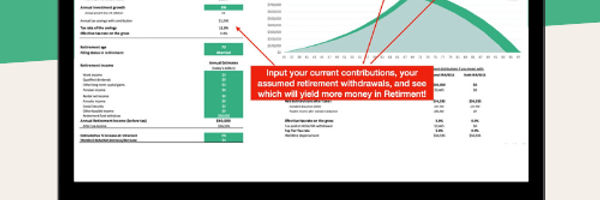Definition
Individual Retirement Accounts, or IRAs, were created by Congress in 1974 to benefit individuals that were not covered by an employment-based retirement plan such as a pension. An IRA is an investment mechanism for tax-deferred retirement saving that is under the control of individuals, not employers.

Roth IRA or 401k? This template will answer your questions.
With this template, you will get:
All DFY, simply add your details
Charts for comparison and clear answer
Easily update for any year (2023, 2024, 2025, etc…)

Explanation
IRAs allow individuals to set aside money on a tax-deferred basis for retirement. The various types of individual retirement accounts include:
Traditional IRAs: an individual retirement account that accepts both taxable and tax-deductible contributions. Money in the account grows on a tax-deferred basis; distributions from the account are taxable when withdrawn.
Roth IRA: an individual retirement account to which nondeductible contributions are made, but growth of the account as well as the withdrawal of funds are tax-exempt.
SIMPLE IRAs: Savings Incentive Match Plans for Employees, allow small businesses to offer employees a way to establish a tax-deferred retirement fund.
SEP IRAs: a Simplified Employee Pension, which can be established by employers or self-employed individuals.
Generally, withdrawals from an IRA can be made penalty-free beginning at age 59 1/2. Contributions to these plans can be both after-tax as well as tax-deductible. Eligibility may also be limited by income.



.jpg)
.jpg)